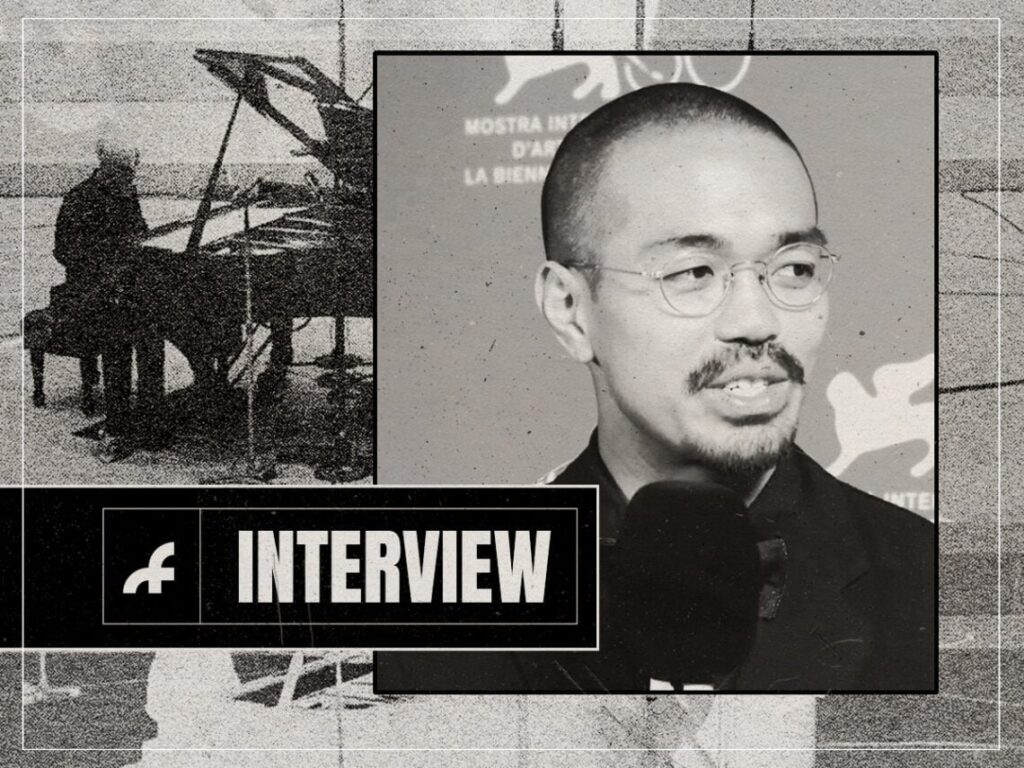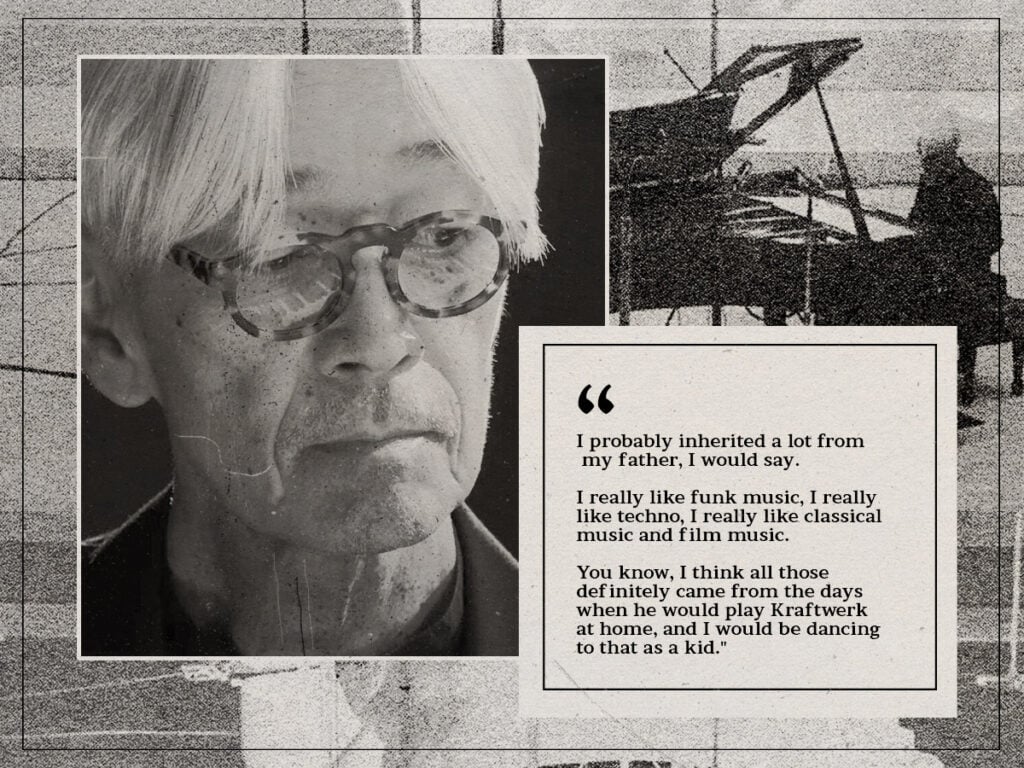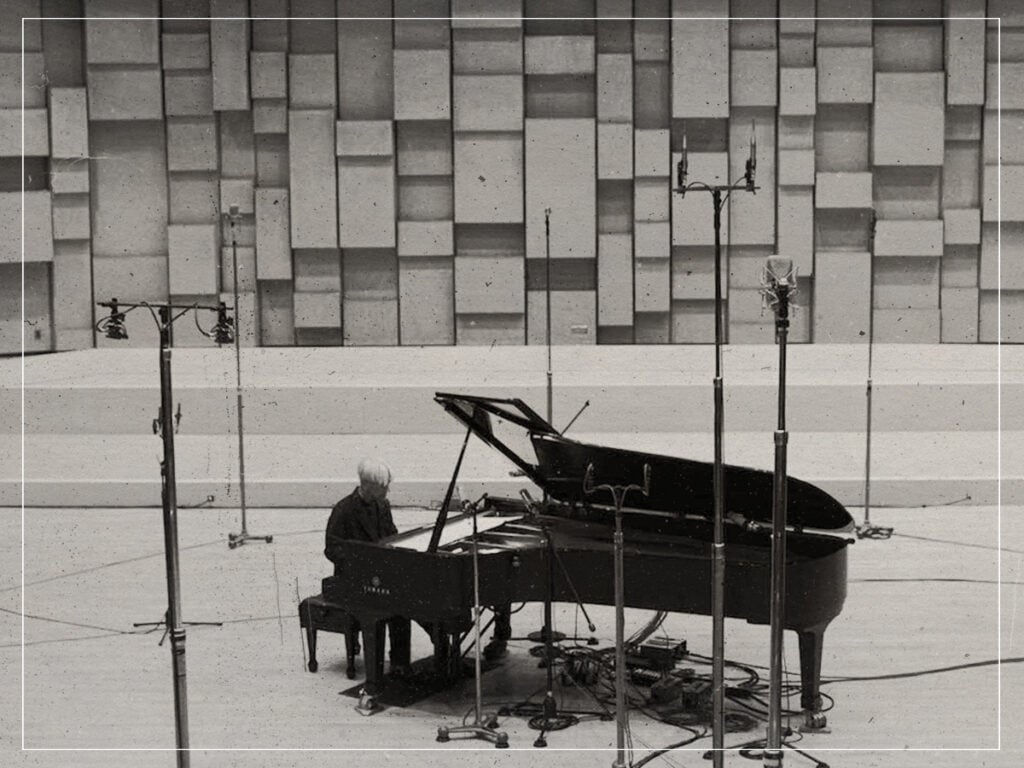The opus of Ryuichi Sakamoto: Neo Sora on directing his father’s final concert
 Posted On
Posted On
(Credits: Far Out / YouTube Still / Modern Films)
Goodbyes are never easy; they’re not designed to be. To look someone in the eye or write a letter expressing what they mean during a time when you know you won’t get a chance to say it again is a nearly impossible task. As he stared down mortality in 1912, the explorer Captain Robert Scott wrote to his wife and expressed his sadness that he wouldn’t see her and his son again.
“Make the boy interested in natural history if you can. It is better than games. Try to make him believe in a God; it is comforting. Oh my dear, my dear, what dreams I had of his future and yet, oh my girl, I know you will face it stoically,” he wrote. “What lots and lots I could tell you of this journey. What tales you would have for the boy, but, oh, what a price to pay. To forfeit the sight of your dear, dear face.”
In that letter, a father says goodbye to his son, whom he knows he will never get to see grow up, and in a final grasp of having any input in his upbringing, tries to steer him towards his own interests. Neo Sora had a slightly different experience when his father, Ryuichi Sakamoto, was diagnosed with terminal cancer, as he didn’t use his interests to say goodbye to his son; rather, it was their shared interests that meant he could say goodbye to the world.
“I probably inherited a lot from my father, I would say.” Neo Sora, director of his father’s goodbye film, Opus, speaks to Far Out from Tokyo about how much his dad influenced his music taste growing up. “I really like funk music, I really like techno, I really like classical music and film music. You know, I think all those definitely came from the days when he would play Kraftwerk at home, and I would be dancing to that as a kid. So, definitely, definitely, he influenced my taste.”
He continued: “But then I will say that I influenced him later on. He was always really interested in what young people were listening to; he was always interested in new musical forms, and so when I was off in college, I would kind of get messages from him saying, ‘What’s the latest music you’re listening to?’ So, he was always really curious… It’s something that annoyed me, to be honest, because every time I showed him something, he would go off and do some kind of remix or collaboration with them.”

Ryuichi Sakamoto’s life revolved around music as he explored various genres and worked on compositions for a number of films. As his taste rubbed off on his son, Sora leaned further towards the filmmaking side of things, becoming a director in his own right. When Sakamoto’s cancer was starting to take a toll, and he wanted to create one more thing before passing, it was clear who he could rely on to bring it to life.
“I was working on a separate film at the time. I was quite busy preparing for that, but then they asked me to do this, and obviously, you don’t know what’s going to happen, but I think his health was heavily deteriorating, so I think there was a possibility that it would be the final performance he would ever do. So, I said, of course, I’ll do anything. My goal and intention throughout was just to do as good as I could.”
That was certainly achieved in Opus. The project isn’t something that can be put down as a documentary or a concert film; it is much more than that. Opus is an insight into the humanity of someone with something superhuman surrounding them. When we listen to Sakamoto’s music or watch films like The Revenant and hear the scores, we are presented with something that most people can’t fathom. The idea of starting with an empty page and silence, ending with such complicated music and layered sound, is a process that a lot can’t connect with.
Opus, a feature-length concert that features Sakamoto playing his piano alone in an empty room, goes beyond just the sound and music and reaches the man behind it. As the camera pans at his hands and eyebrows, his lips and his fingers, and as the music takes energy out of him and mistakes are made during improvised sections, we, as viewers, are taken through his life with his work as the vehicle. The humanity of a musician and the complexity of the creative process shines through in every second.
“Those are the moments that stand out, those where he messes up or explores or whatever,” says Neo Sora, reflecting on the moment in the film where his father stops halfway through a song and starts again. “I really like those moments because I think it really shows you how musicians, at least him, thought in a musical way. The song has this improvised section in the middle; he’s played it a bunch of times throughout his career, but he was at a moment in his life when he was really exploring dissonances and exploring harmonic frequencies. I think the fact he messes up kind of unleashes him and lets him explore more. I think if he had managed to play the song well and perfectly, as he intended, he wouldn’t have broken off into these strange chords that otherwise he probably wouldn’t have played.”
He continued, “I think as he was doing so, he was really enjoying the sounds and dissonant tones that were coming out of his piano and into the space of the studio. I think you could really see how he was enjoying that process as well. I’m glad I kept that in.”
Though Neo Sora often dismissed his contributions as a director during our interview, saying his Dad decided on most aspects of the film and he was just there to make sure everything ran smoothly, he has to take credit for being able to capture those human elements of a musician at work. “My biggest directorial contribution: I asked for the setlist early,” he said.
“Usually, he kind of picks the setlist a day before or a couple of days before if it was a regular concert. Sometimes, he’d write a stack of sheet music, and if the vibe isn’t right, he would switch songs. Something that I asked as a director was to decide on a setlist and stick to it… The whole crew really listened to previous recordings of those songs over and over and over again until the structure of the song was completely fluent to us.”

Now that the film is out, Sora can watch back and be taken through different periods of his life with his father by listening to the music being played. He can also reflect on the final days of his father’s life as they worked together on something so beautiful. Fathers’ influence and sons’ innovation come together to create the perfect swansong. Neo Sora looks back at it now and smiles, as at the time he was too enveloped in the task at hand to take everything in properly.
“There was just too many practical things that I needed to keep track of. So, I had the music reader to my right and I was reading the music while watching the camera feeds and giving direction in the headset. To be honest, it was a little bit too much to have. Obviously, I’m having an emotional reaction to the music in the moment as well, but the overwhelming thing that was on my mind while we were shooting was definitely the practicalities and doing a good job. I guess that’s the reality of the movie. Everything just basically focuses on capturing the emotion, and so, yeah, I don’t think I have a specific memory that really kicked me when making the film. But those pieces of music he plays are really familiar to me.”
Sakamoto never got a chance to see the film in its entirety before passing away; however, he enjoyed the process of performing, and what he did get to see, he approved of. In his letter to his wife, Captain Robert Scott expressed that you could find comfort in God, and while that’s true, Sakamoto could also find it in knowing his legacy had been so beautifully captured by those closest to him. A perfect collection of the songs that made up his creative life. A true opus.
[embedded content]


